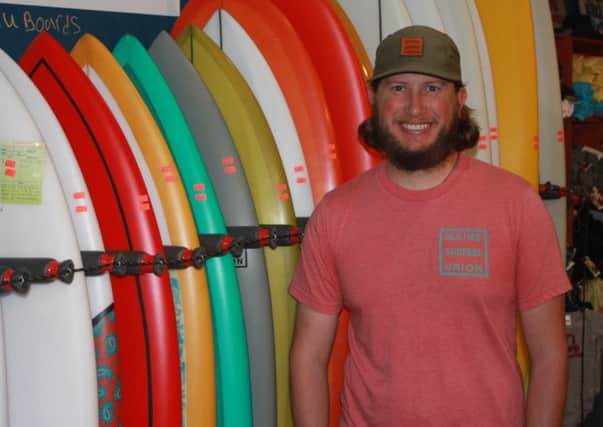Roger Cox: Portland surfers take a chance on Maine


I’ve stumbled upon some unlikely surf shops in my time, but Maine Surfers Union (MSU) in Portland, Maine, pretty much takes the cake. For a start, it’s several miles from the nearest surfable wave. Portland, as its name suggests, is a port town – great if you’re looking to buy lobster fresh off the boat; not so great if you’re looking for surf. Then there’s the question of the weather. Much like the east coast of Scotland, the east coast of Maine gets its biggest and best waves in the winter, but winter here is something else. This year, at their coldest, water temperatures in this part of the state hovered around the one degree C mark; factoring in windchill, air temps sometimes dip as low as -25 degrees C. All of which makes January in Scotland seem almost tropical by comparison.
To surf here all year round, then, you have to be either supremely nuts or supremely organised, as MSU’s owner Charlie Fox – definitely a member of the latter category – explains.
Advertisement
Hide AdAdvertisement
Hide Ad“I have my little secret system,” he grins. “I put on my wetsuit at home, pull it on half way so I don’t get too sweaty, then drive to the beach with the heat on. Boots and gloves are on the dash where the heater is, pumping as much hot air as possible.
“The problem with Maine is, our storms come in so harsh and crazy that you’re looking for a place where either you’re sheltered from the wind or you’re getting offshore breeze, and also a place where it’s hitting the swell just right where you’re willing to go out and surf. So you may drive around for 30 minutes or an hour looking for a spot.
“When you get to the beach you put on the top half of the suit and you put on your boots and gloves and just run to the water as fast as you can. Then, when you get out there, you save your pee for that awful time when you start cooling down and you need that reserve heater, as they call it.”
Fox moved back to Portland three years ago after spending eight years in California, during which time he learned the fine art of surfboard shaping and began to experiment with some of the design ideas he’d learned about while working as a sailing instructor. Rather than simply selling mass-produced boards, as many surf shops do, when he opened his own store he decided he wanted to carry boards that had been handmade in the US, and, wherever possible, boards made by local shapers.
As if to emphasise the point, at the back of MSU there’s a window through which shoppers can watch Fox and MSU head shaper Nick Aleandro hard at work, sculpting basic foam slabs called blanks into bespoke creations, often developed in consultation with customers.
“Our whole philosophy with the store is to educate the customer as much as possible,” he says, “even if they don’t purchase something from us, at least have them leave with a bit more knowledge.”
A quick tour of the MSU surfboard racks reveals a whole host of innovative design ideas, from a stubby little board with hatchet fins – designed to provide a killer combination of down-the-line speed and a quick-release tail for swift, sliding turns – to boards inspired by Bob Simmons’ legendary hydrodynamic planing hull, developed in the 1940s and 50s with reference to both ancient Hawaiian surfboard designs and what was then cutting edge US Navy research. As Fox explains, it’s all about finding a board that works in Maine’s frequently sub-optimal surf.
Advertisement
Hide AdAdvertisement
Hide Ad“Our waves are pretty mushy a lot of the time,” he says, “they don’t have a lot of force behind them compared to out west, so you need something that has more volume underneath you. We’re trying to move towards people getting the right board and away from all these crazy high-performance potato chip things that only work 10 per cent of the time around here.”
Maine might not be the easiest place in the world to be a surfer, but when everything comes together the rewards can be immense. “Maine’s sorta like the Pacific Northwest,” says Fox, “it’s still a very untouched territory – everything to the north-east of us here, anyway.”
Given that Portland is separated from the Canadian border by around 200 miles of jagged coastline, home to countless beaches, reefs, points and obscure, uninhabited islands, that’s an awful lot of untapped potential for anyone prepared do a little map-reading – and, of course, to brave the cold.